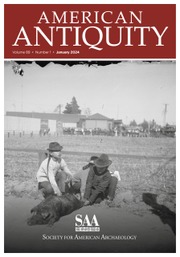Article contents
The Finley Site: Discovery of Yuma Points, in Situ, near Eden, Wyoming1
Published online by Cambridge University Press: 25 January 2017
Extract
A preliminary report has already been made on the Finley site,2 located in Sweetwater County, southwestern Wyoming, in the southeast corner of the N.E. ¼ of Section 25, Township 24 N., Range 106 W., about four and a half miles east and a little south of the town of Eden, which itself is approximately thirty-seven miles northwest of Rock Springs. The altitude of the site is approximately 6750 feet.
- Type
- Research Article
- Information
- Copyright
- Copyright © The Society for American Archaeology 1943
Footnotes
Preliminary work was carried on in 1940 for the University Museum of Philadelphia, at a buried Yuma site, near Eden, Wyoming, under the direction of Mr. Linton Satterthwaite. This work was continued in the summer of 1941 sponsored jointly by the University Museum and the Nebraska State Museum. The party in 1941 included Frank J. Dudek, and L. Robert Wolfe from the latter institution, and Dr. John T. Hack, Robert P. Howard and Edgar B. Howard representing the University Museum. Dr. Hack, of Hofstra College, carried on the geological work, the results of which appear in the following part of this report. F. J. Dudek and R. P. Howard assisted Dr. Hack in the topographic work from time to time. Mr. O. M. Finley, formerly of Eden, Wyoming, who discovered the site, and through Mr. Harold J. Cook of Agate, Nebraska, brought it to our attention, spent as much time with us as he could, without interfering with his Government duties. We wish to take this opportunity to thank him for what he did to help us in so many ways. We also wish to thank Dr. W. H. Bradley, of the U. S. Geological Survey, for his interest and suggestions when he visited the site.
References
2 Howard, Satterthwaite and Bache, 1941. See Bibliography, pp. 291–295, following.
3 Byers, 1942.
4 Figgins, 1934; Renaud, 1934; Roberts, 1935; Howard, 1935; and Wormington, 1939.
5 Wormington, 1939.
6 Barbour and Schultz, 1932a.
7 Roberts, 1935, p. 18; Howard, 1933, Pl. 3, A, top row.
8 Hibbin, 1941, Pl. 5, No. 2.
9 Schultz and Eiseley, 1935.
10 Howard, 1935.
11 Cook, H. J., 1927; Figgins, 1927.
12 Jenks, 1937.
13 Howard, Satterthwaite and Bache, 1941.
14 Ibid., Pl. 10, also shows this transition.
15 Ibid.
- 17
- Cited by


